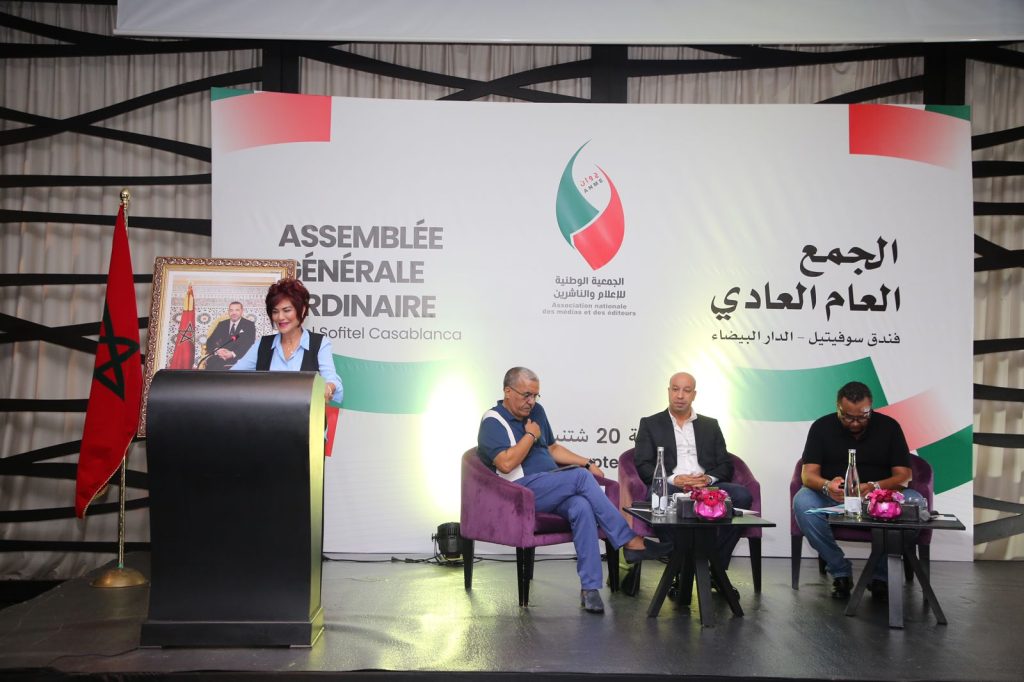The National Association of Media and Publishers (ANME) held its General Assembly this Friday, September 20, at the Sofitel Hotel in Casablanca, bringing together key players from Morocco’s media sector. The meeting served as a platform to address the challenges faced by the press and to discuss the necessary reforms for its development, especially with major international events on the horizon, like the 2030 FIFA World Cup.
The Assembly opened with a speech by Fatima Ouriaghli, Vice President of ANME, who highlighted the stakes of the gathering. She emphasized that this assembly would not only present the moral and financial reports but also address the pressing issues affecting the national press. “Many initiatives have already been launched by ANME to tackle these issues, but numerous challenges still lie ahead,” she declared.
Mokhtar Laghzaoui, ANME’s Secretary General, presented the moral report, tracing the association’s journey over the past four years. Born during a critical period in Moroccan media history, ANME was established amidst the unprecedented crisis brought on by the COVID-19 pandemic, which nearly led to the sector’s collapse. Despite its relatively recent creation, the association has played a vital role in implementing key measures, such as ensuring the continuation of salaries for press employees—an effort spearheaded by ANME President Driss Chahtane. However, Laghzaoui raised a pivotal question: as Morocco prepares to host large-scale events like the 2030 World Cup, is the national press equipped to handle such significant challenges? He stressed the urgent need for a deep restructuring of sports journalism, citing unprofessional behavior observed during the coverage of the 2022 Qatar World Cup. Training in both writing and communication skills must be a priority to elevate the overall standard before these global events.
Financial matters were tackled next by Khalid El Horri, ANME’s Treasurer, who detailed the association’s financial situation. The current treasury holds 3.42 million dirhams, down from an initial 6.38 million. Annual operating expenses have amounted to 5.38 million dirhams, largely supported by government aid. Thanks to strict financial management, ANME has managed to generate a net surplus of 1 million dirhams, which will be used to fund language training programs for journalists, aimed at enhancing their communication skills, particularly for international coverage. El Horri also mentioned currency exchange operations during the last African Cup of Nations, which allowed the association to recover 210,000 dirhams in euros.
Abdelmounaim Dilami, Honorary President of ANME, praised the association’s ability to adapt to profound social, economic, and political shifts. “ANME today provides a unified voice for the sector, placing increasing emphasis on ethics and moral values,” he noted, commending Driss Chahtane’s dynamic leadership in addressing the sector’s problems.
Younes Moujahid, President of the Press Council, also spoke, addressing one of the most critical aspects of the current crisis: the structural weakness of media companies. He emphasized the importance of restructuring these entities to ensure adherence to ethical standards, such as avoiding plagiarism and maintaining professionalism. “Only a strong, professional press can solve the issues facing the sector as a whole, but this requires firm political commitment,” he remarked. The rapid transition to digital media was another point of discussion, which has had detrimental effects on the sector. “The public expects a professional, responsible, and self-regulating press,” he insisted.
Abdelkabir Akhchichen, President of the National Press Union, condemned the unprecedented precariousness plaguing the sector. He called for an overhaul of the legal framework to combat mediocrity and stressed that the union and ANME are key allies in the fight to improve working conditions for journalists. “We will continue to advocate for permanent state support for the national press,” he declared.
Abdellah El Bakkali, President of the Press Card Council, expressed his concern about the rise of fake journalists, claiming that 40% of current press cards have been issued to individuals who do not meet professional criteria. He urged the need to clearly define what constitutes a media company and put an end to the proliferation of fictitious entities. “The year 2025 will be crucial for the future of the national press. We must stop this bleeding once and for all,” he warned.
In closing, ANME President Driss Chahtane delivered a somber message, lamenting that professional journalists are now a minority in their own field. He denounced the growing influence of “fake journalists” and influencers who self-proclaim as journalists without adhering to professional standards. Chahtane emphasized the need for ANME’s intervention to restore the prestige of Moroccan journalism. “We will work tirelessly to establish a strong and effective legal framework and implement solid, structured media companies,” he vowed. He also announced upcoming reforms concerning state financial support for media companies, with stricter criteria to ensure that only well-structured entities can benefit.
